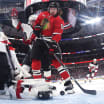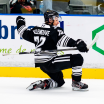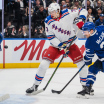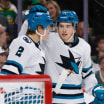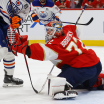Jagr glad to keep playing, teaching as he reaches 50th birthday
Third-leading goal-scorer in NHL history may continue career in Czech Republic beyond this season
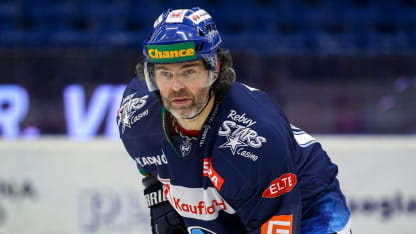
© Josef Poláček, rytirikladno.cz
"My schedule is very busy," he said.
Such is life for Jagr, owner, president and player with Kladno, his hometown team in the Extraliga, the top professional league in the Czech Republic. When he turns 50 on Tuesday, he'll fulfill his prophecy that he'd be playing at that golden age.
Some thought Jagr was joking when he spoke in his younger days about playing at 50. But the forward, in his 34th professional season, including 24 in the NHL, said he always believed it.
"Well, when you're 30 and saying you're going to play until 50, some other people are laughing because they don't really know," Jagr told NHL.com on Thursday. "And I knew it. I'm built differently."
Jagr's career has come full circle with Kladno, where he made his professional debut in the 1988-89 season and took over as majority owner from his father, also named Jaromir, in 2011. He last played in the NHL with the Calgary Flames in 2017-18. He scored seven points (one goal, six assists) in 22 games before clearing waivers and being assigned, at his request, to Kladno on Jan. 29, 2018.
By then, Jagr had nothing to prove in the NHL. The No. 5 pick by the Pittsburgh Penguins in the 1990 NHL Draft, he won the Stanley Cup twice with the Penguins (1991, 1992) and the Hart Trophy voted as NHL most valuable player in 1998-99, when he led the League with 127 points (44 goals, 83 assists) in 81 games.
Jagr is first in NHL history in game-winning goals (135), second in points (1,921), third in goals (766), fourth in games played (1,733) and fifth in assists (1,155). He'll likely be fourth in goals soon; Washington Capitals forward Alex Ovechkin, who entered Sunday with 759, is closing in on him.
"Obviously he's a legend," Ovechkin said. "He's a legend who set lots of records. He loves hockey so much so he's still playing. God gave him health, and that's a good thing."
This season, Jagr has scored 19 points (eight goals, 11 assists) in 35 games. Recently he's been more of a part-time player, part-time unofficial assistant after being sidelined with minor injuries and returning Jan. 30.
He played 9:40, skating on the fourth line, and had two shots on goal, but was held without a point in Kladno's 6-4 win against Brno on Sunday.
"I had some injuries, but our team played very well so I didn't want to step in," Jagr said. "I like to teach the players, give them what I learned. So when I play on the fourth line or sometimes when I don't play, I've got more time for the players or for the kids with me to tell them what I've learned and just help them that way. And I like it."
Jagr likes it enough that he's considering playing next season, particularly if Kladno can avoid relegation and remain in the Extraliga. Though Kladno (17-23-8, including five overtime wins) is 14th in the 15-team league, it has won three straight games and five of its past six.
Some of Jagr's reasons for playing are complicated related to the business side of being Kladno's owner, but his main one is the simplest.
"First of all, I love it," he said. "I love it for a lot of different reasons. It doesn't have to be necessarily you play the game, but it's being around the guys, helping the people be on the ice."
\\\\
Jagr said he has no plans for a 50th birthday party.
"No, no," he said. "I never celebrate my birthday."
That wasn't always the case. Forward Rick Tocchet was traded to the Penguins by the Philadelphia Flyers on Feb. 19, 1992, four days after Jagr turned 20, and arrived in time for his birthday bash.
"There were 1,000 people at this sports garden for his birthday party," said Tocchet, now an "NHL on TNT" studio analyst. "It was crazy. There were 950 girls there. He had that long hair."
Jagr's trademark mullet flowing out the back of his helmet helped make him an instant attraction in Pittsburgh, where he teamed with Mario Lemieux to win the Stanley Cup in each of his first two NHL seasons. He was far from all flash, though.
Highly skilled and naturally strong, he'd fill out (6-foot-3, 230 pounds) with a relentless work ethic. Former Penguins teammate Phil Bourque recalls Jagr working on his shot with then-assistant Rick Kehoe well after practice was over and then heading into the gym.
"He went into the weight room and was just forever with the strength and conditioning coach working on either little things or big things, like Olympic power lifts," said Bourque, a Penguins radio analyst. "Back in the early '90s, we were like, 'What is this?' Nobody was doing this. … But here's a guy that made guys that worked their tails off go, 'Wow. This guy is just a motor that never quits.'"
Jagr has maintained that commitment throughout his career, from Pittsburgh to Washington, the New York Rangers, a three-season stint in the Kontinental Hockey League with Omsk (2008-11), and then back to the NHL with the Philadelphia Flyers, Dallas Stars, Boston Bruins, New Jersey Devils, Florida Panthers and Flames before returning to Kladno.
Much of it was done unaccompanied at odd hours.
"He had a key to the gym, and he would go back at 8 o' clock at night," said Capitals coach Peter Laviolette, who coached Jagr with the Flyers in 2011-12. "He would skate on his own or he would train in the weight room on his own. And he had some different techniques."
Techniques such as skating while wearing a weighted vest and ankle weights and shooting weighted pucks. Flames forward Matthew Tkachuk remembers Jagr stick-handling with a 20-pound medicine ball before a game against the Detroit Red Wings and scoring in a 6-3 victory.
"Then he did it for the rest of the season until he wasn't on the team anymore," Tkachuk said.
Jagr's off-ice warmup sometimes included strapping a sled harness to his upper body and dragging a resisting athletic trainer behind him down an arena hallway.
"Other things have worked for me," Jagr said. "I like to adjust. I like to study. I like to look at things. My huge advantage is if I do something, the body gives me an answer right away. I knew the next day whether it works or not. … And I'm not afraid to change it."
Jagr would often remain at the arena after home games, or go home and come back later to work out. On the road, he'd find other accommodations.
Travis Zajac was awakened in his hotel room at 1 a.m. once by a thumping. The then-Devils center quickly figured out that the hotel gym was located directly above his room.
"I realized this could only be one guy not in bed trying to get to sleep," Zajac said. "The next morning, I asked 'Jags' and he was like, 'Yeah, I was throwing medicine balls around.' When everyone else was trying to get to sleep, he was up there making a racket trying to get better."
\\\\
Panthers center Aleksander Barkov had a similar experience when he bumped into Jagr in the hotel hallway after playing video games one night.
"I see him walking with a weighted vest, ankle weights and hockey stick in the hotel [and he's] asking me, 'Where are you going?'" Barkov said. "I'm like, 'Sleep.' He's like, 'See? You go sleep. I go work out.' And then he left, and I think that was one of the turning points in my career. Then I started actually working out more.
"So that teaches a lot."
Jagr continues to enjoy teaching and encouraging younger players with Kladno. That's part of what keeps him playing.
"I'm more happy to see if I show somebody something and he does it and he improves," he said. "It makes me more happy than if I do it."
With Florida in 2015-16, the season when he turned 44, Jagr scored 66 points (27 goals, 39 assists) in 79 games while playing on a line with Barkov and Jonathan Huberdeau. Jagr's gym workouts were mostly a solitary thing, but on the ice he'd do shooting and skating drills with Barkov and Huberdeau and stress the importance of having two hands on the stick to receive passes and be strong on the puck.
"He was just telling us how good we were as players and I didn't expect that," said Huberdeau, who is second in the NHL with 64 points (17 goals, 47 assists) this season, one behind Leon Draisaitl of the Edmonton Oilers. "A guy like this sometimes you never know, but he was there to help the young guys and talking to us every day and telling us a little bit what to do and to play at our strengths. I think we got better from that."
Jagr didn't reserve his words of encouragement for teammates only. Chicago Blackhawks forward Patrick Kane, a three-time Stanley Cup winner (2010, 2013, 2015) who won the Hart Trophy in 2015-16, had a focus-changing encounter with Jagr in Vancouver once.
"He came up to me and was telling me that he thinks I could be a really special player and could be even better than I was, and I needed to focus and put all my energy and effort into hockey," Kane said. "So it really got to me because this was a guy who I watched growing up and had an amazing career. … When he's telling you that, you start thinking about what you can do a little bit more of and you definitely start changing some things."
\\\\
Jagr remembers his father telling him when he was younger, "If you're like me, you're going to be stronger when you're 45, like I was." So playing past his 50th birthday is what Jagr always expected, even if there are some days when he doesn't feel as strong.
"Of course, sometimes it's tough when you are injured or you don't feel very well," Jagr said. "And when you're tired you go on the ice and the pace of the younger guys, of course, it makes you tired. But there's different steps to love hockey."
Vegas Golden Knights coach Peter DeBoer witnessed it coaching Jagr with the Devils from 2013-15. When Jagr led New Jersey with 67 points (24 goals, 43 assists) in 82 games in 2013-14, the season when he turned 42, his statements about wanting to play at 50 no longer seemed so far-fetched.
"He called it back then," DeBoer said. "I remember having conversations with him and I'm not surprised. If there's one guy that could do it, [he's] genetically gifted, but he also was the hardest-working guy I've ever been around. His training regimen after we were done with practice, in the summertime, was totally next level, and he loves the game."
Bourque visited Jagr in Kladno in January 2020, partly as an unofficial emissary from the Penguins to discuss retiring his No. 68 in the future. While catching up with his friend, Bourque got a better idea of why he is still playing.
"I went to a game," Bourque said. "It's really cool. It's a great atmosphere. And he told me a little bit about how important it is that he stays with the team because all the big-money sponsors are tied to him. And once he leaves, they leave."
Jagr acknowledged concerns about losing sponsors as "other stuff" affecting his decision to play, but said he also feels an obligation to Kladno's junior program, which is part of his responsibilities as owner.
"Here, when you have a professional team, you have all the categories, the kids category, under you," he said. "You've got to have it if you want to have a professional team. … So you've got always 450 kids that you're responsible for."
Remaining in the Extraliga would help. Jagr said doing so would give Kladno a chance to sign better players and upgrade a roster that includes former NHL players such as forward Tomas Plekanec, defenseman Jake Dotchin and goalie Landon Bow.
Jagr said the free agent market was thin by the time Kladno earned promotion from the second-tier Chance Liga at the end of last April. Kladno was also hampered by having to play all its games on the road this season because its arena is being renovated.
Kladno is 17 points ahead of 15th-place Zlin with eight games remaining, so it will likely escape automatic relegation, but must climb above 14th to avoid a play-out series with the Chance Liga winner. The Knights have closed within one point of 13th-place Litvinov.
"If we stay in the [Extraliga] and if I know I have a chance to sign some good players," Jagr said, "I would like to stay and play and kind of be more of a player, practice more, just concentrate more on playing because then we would have a chance to do something."
Kladno's arena is expected to be ready for the start of next season. That and the hope of playing a second straight season in the Extraliga would give Jagr motivation to continue to play, and play better, if possible.
"At my age, you need to have a goal," he said. "If I say, 'Yes, I'm going to do it,' I know I can get ready for it. Age doesn't matter. If I stay healthy, I've got no problem. If I see the bright future, I don't mind to go and practice and do everything for it. I've got no problems with that.
"But I just want to see the bright future."







